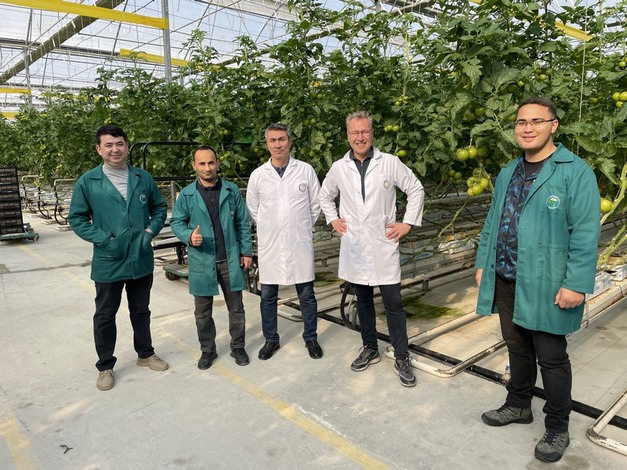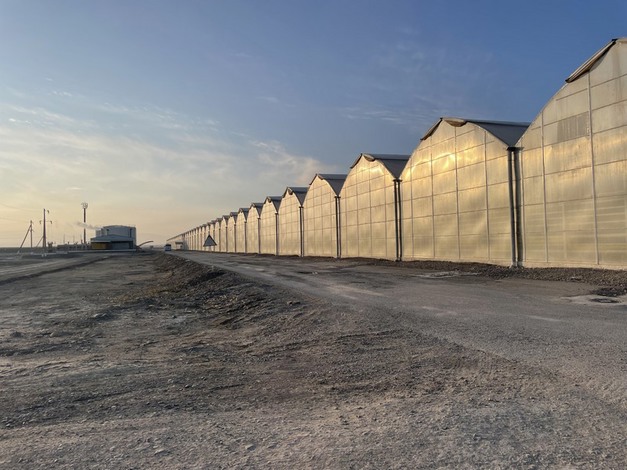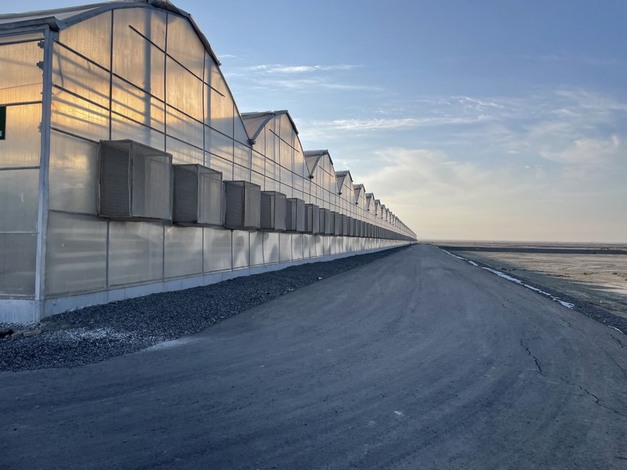"They are 4 hours ahead of us, so when I wake up in the morning, their day is already well underway, and several questions are ready to be discussed. I can take over and operate the climate computer, look at graphs, see watering strategies, and share data with different programs," says Jan Zegwaard. The nursery he supervises is not only 5,500 kilometers away but also in one of the most closed-off countries in the world: Turkmenistan. "When you know the climate over there, you wouldn't think much of it. But when you see what comes out of the greenhouses: that's top notch."

Digital advice
It has been three years since Jan, a former grower himself, became involved with the E.S. Yigit nursery through GrowersAdvice4You. The club of cultivation consultants had dealt with this international axe before and, at the time, was already guiding nurseries in Uzbekistan and Afghanistan. With monthly visits and digital advice, they can support remote greenhouses well. But even for them, corona threw a spanner in the works, which is why digital collaboration became vital. "You make sure you cover the same topics as you'd normally do, only you can't see the greenhouse in real life," Jan says. "You don't walk among the plants but come a long way."
And that strategy has gone well, with Jan already working with the company for three years. At first, they advised on about 10 hectares of greenhouses, then Jan, together with Michel van Ruijven and Martien Duijndam, were allowed to advise all 30 hectares. Now the company expanded to 50 hectares.

The climate is extreme in the Karakum desert, where the greenhouses are found, with temperatures that can reach 45 degrees Celsius in the pitch-dry summers and drop below freezing in the winter. The foil greenhouses are therefore equipped with both substantial heating and cooling, some of it pad-and-fan. A counter-cyclical cultivation schedule has been established based on light and temperature data, where they sow in summer and use the refrigerated greenhouses first. Cultivation is done on coir and, much to Jan's delight makes use of a pipe-rail system.
"We are now investigating how to improve the automation. For example, with a new climate computer. Then we can make full use of techniques like the available heat buffers and control the boiler more sharply," he says. And that strategy is very different from back home, as Turkmenistan has one of the largest gas reserves in the world. "There is no shortage of gas, and it's not too expensive either," Jan says.
 Also, a small trial of LED lighting is now hanging in the greenhouses. "We have to start calculating for during the winter when the light radiation is just at the limit of what is permissible to get a mature crop through. We have already made adjustments in the cultivation to keep enough energy in the plant, so maybe this offers some room."
Also, a small trial of LED lighting is now hanging in the greenhouses. "We have to start calculating for during the winter when the light radiation is just at the limit of what is permissible to get a mature crop through. We have already made adjustments in the cultivation to keep enough energy in the plant, so maybe this offers some room."
Cultivation company E.S. Yigit is part of and large conglomerate, which is quite remarkable. The group also includes a tire company, a porcelain factory, and an arable farm of a few thousand acres. "Everything is centrally regulated and managed," says Jan, and his example clarifies how different that is from the Netherlands. "At the group's headquarters is located in the capital, and they can look inside the greenhouses 200 kilometers away on a big screen. In Block A alone, there are already at least 50 different cameras broadcasting non-stop what is happening in the greenhouse." It exemplifies the top-down culture in the company and in the country.
 Tightly woven organization
Tightly woven organization
The organization of the nursery itself is also tightly woven. There are facility departments for purchasing, sales, finance, and personnel. It is an elaborate organization. People in the country live far away from the nursery and are taken there daily by buses. Management and growers sleep on the farm. An honor that also fell to Jan, as he could finally visit the greenhouses in January of this year. Coincidentally, also during the coldest weeks Turkmenistan has experienced in years. "The overcapacity of the heating system came in handy. And it wasn't just for that reason that it was a special trip. You don't just get into Turkmenistan - you have to be invited, screened, and admitted - and places were visited where few Europeans set foot. Then there are the digital limitations. Due to the limitation of the Internet, Whatsapp, for example, does not work. "It's a very closed country. That also affects the presence of mechanics, for example, but the import of biological control is also simply not allowed yet," Jan summarizes.
Since his visit, Jan has been even more impressed with the nursery. "The managers and agronomists consist of many intelligent, young people. They are obliged to learn English because they see great potential for further growth. They were the first company in Turkmenistan to receive the Global G.A.P. certificate and invested a lot to do so because it increases their export potential." There are about 600 acres of greenhouses in Turkmenistan, he estimates. "This company has the potential and plan to grow to more than 200 hectares. The product is already going to Kazakhstan, Uzbekistan, Russia, and the Middle East, under the Mahmal Agroproduct brand, and they are continuing to expand exports. We try to keep them from taking too big a step at a time because, again, stability is important. But they are tremendously eager to develop, learn and grow."
For more information:
Jan Zegwaard
GrowersAdvice4You
Email: j.zegwaard64@gmail.com

